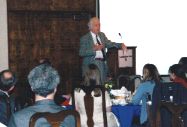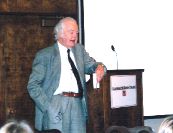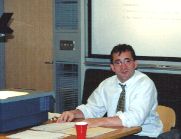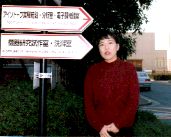|
|

|
CULTURE, BRAIN, MIND & MEDICINE
(January 26 - April 20, 1999)
|
 |
Introduction
An innovative interdisciplinary and cross-cultural
effort for understanding some aspects of the human mind was undertaken for the first time
at Pitzer, Claremont McKenna, and Harvey Mudd Colleges. The event entitled "Luce
Faculty Seminar on Culture, Brain, Mind, and Medicine" was held during the past
spring (from January 26 to April 20, 1999). It included a series of four lectures and
in-depth professional discussions. Many academic fields were represented: biology,
education, engineering, English, government, history, mathematics, music, neuropsychology,
philosophy, political science, physics, pastoral care and counseling, psychology,
religion, sociology, and Spanish. The seminar attracted faculty members and students from
the Claremont Graduate University, Claremont School of Theology, Joint Science Department,
as well as the Claremont McKenna, Harvey Mudd, Pitzer, Pomona, and Scripps Colleges. The
lectures were open to the public and attracted professionals and lay persons from the
surrounding communities. Overall, approximately 500 participants took advantage of the
event. |
|
PROGRAM
The seminar will provide faculty members of the Claremont Colleges
the most up-to-date exposure to the new developments of the interdisciplinary inquiry in
culture, brain, mind, and medicine. In particular, the seminar offers subject matter that
could be of interest to a wide range of academicians, from art, literature, philosophy,
and government to biology, psychology, anthropology, and neuroscience. Leading
researchers, that have skillfully undertaken an interdisciplinary approach in studying
brain, mind, body, and culture interactions, and their clinical implications, will be
invited as speakers.
The Faculty Seminar is intended to promote interdisciplinary
communication, as well as, an open and active discussion between anthropologists,
psychologists, linguists, philosophers of science, historians, and even neuroscientists of
the Claremont Colleges Consortium. Hopefully, the seminar will promote a lasting and
fruitful dialogue between interested faculty members on brain, mind and body issues across
disciplinary boundaries.
At the end of the Faculty Seminar, faculty members would gain some
integrative understanding of certain human behaviors like religious experiences,
alternative states of consciousness, traditional healing processes, etc. It would also
provide some insights on the methodological intricacies of this kind of interdisciplinary
research, and a sense of the richness of this approach.
Shamans and Endorphins
Tuesday, January 26, 1999.
Raymond H. Prince, MD, MSc. Retired professor of Psychiatry,
McGill University; former Director of the Division of Social & Transcultural
Psychiatry; and former Editor, "Transcultural Psychiatry Research Review"
3:00 PM - 4:00 Presentation *
4:00 - 5:00 PM Discussion Session *
Location: Security Pacific Foundation Seminar Room 101, W.M.
Keck Science Center.
5:00-5:30 PM Break
5:30 PM Reception
6:00 PM Dinner
6:45 - 7:30 PM Public Lecture (including 10 min of questions period)
Location: Marian Miner Cook Athenaeum
Ethnicity and
Variability of Responses to Psychotropic Drugs
Tuesday March 2, 1999.
Keh-Ming Lin, MD, MPH. Professor of Psychiatry; Director,
NIMH Research Center on The Psychobiology of Ethnicity, UCLA.
3:00 PM - 4:00 Presentation *
4:00 - 5:00 PM Discussion Session *
Location: Security Pacific Foundation Seminar Room 101, W.M.
Keck Science Center.
5:00-5:30 PM Break
5:30 PM Reception
6:00 PM Dinner
6:45 - 7:30 PM Public Lecture (including 10 min of questions period)
Location: Marian Miner Cook Athenaeum
Cultural Models, Connectionism, and
Psychodynamics: How Culture gets Inside the Mind.
Tuesday, March 30, 1999
Drew Westen, PhD. Professor of Psychology, Harvard
University.
4:00 PM - 5:00 Presentation *
5:00 - 6 PM Discussion Session *
Location: Security Pacific Foundation Seminar Room 101, W.M. Keck Science Center.
6:15 PM Break
6:15 - 7:00 PM Dinner *
7:00 - 7:45 PM Public Lecture "How Culture gets Inside the Mind"
(including 10 min of questions period)
Location: Galileo Hall, Harvey Mudd College.
Neural
Correlates of Japanese Reading:
Brain Imaging Studies.
Tuesday, April 20, 1999.
Sachiko Koyama, Ph.D., Professor, Department of Integrative
Physiology, National Institute for Physiological Sciences, Okazaki, Aichi, Japan.
5:00 - 6 PM Presentation
Location: Performance Space, Edythe and Eli Broad Center, Pizer College.
6:00 - 6:30 PM Break
6:30 - 8:00 PM Dinner & Discussion*
Location: Founders Room, McConnell Center, Pitzer College.
* Limited to registered faculty
Presented by
The Brain, Mind, & Medicine: Cross-Cultural Perspectives Program
Pitzer, Harvey Mudd, and Claremont McKenna Colleges |
|

Dr. Raymond H. Prince, Professor of Psychiatry, McGill
University.
|
LECTURES
Shamans & Endorphins
The first guest speaker was Dr. Raymond Prince, one of the
founding figures of transcultural psychiatry and retired Professor of Psychiatry at McGill
University. The connection between shamans and endorphins is truly a great and fascinating
interdisciplinary exercise in the study of the human mind. Dr. Prince and coworkers
suspected the presence of beta-endorphins among the trancing devotees at the Thaipusam
Festival in Kuala Lumpur, Malaysia. Although the researchers were unable to get conclusive
results, the study remains an exceptional multidisciplinary project for understanding the
trance states and spontaneous analgesia related to certain religious ceremonies in a
non-Western setting.
Readings. Raymond H.
Prince. Shamans and Endorphins: Hypotheses for a Synthesis. Ethos
1982;10:409-423.
Frank R. Ervin, Roberta M. Palmour, Beverly
E. Pearson Murphy, Raymond Prince, and Ronald C. Simons. The Psychobiology of Trance /
II: Physiological and Endocrinological Correlates. Transcultural Psychiatric Research
Review 1988;25:267-284. |

Dr. Keh-Ming Lin, Professor of Psychiatry, UCLA.
|
Ethnic Variability of Responses to Psychotropic Medications
Over the past decade, medical research has
consistently shown that members of some ethnocultural groups were receiving inappropriate
doses of psychotropic medicines. Further studies suggest striking interindividual and
cross-ethnic differences in the response to psychotropic medicines. Our second guest
speaker Dr. Keh-Ming Lin is conducting research, at the heart of the young field of
pharmacogenetics. Many pharmacological processes seem to explain the clinical observation
of interethnic differences in the doses required, side effects, toxic reactions, etc. Dr.
Lin is Professor of Psychiatry at UCLA and founder/director of the National Institute of
Mental Health Research Center on the Psychobiology of Ethnicity.
Readings. Keh-Ming Lin and Russell E. Poland. Ethnicity, Culture, and
Psychopharmacology. In Pshychopharmacology: The Fourth Generation of Progress.
Edited by Floyd E. Bloom and David J. Kupfer. New York: Raven Press, 1995;
1907-1917. |

Professor Drew Westen, Department of Psychiatry,
Harvard Medical School.
|
How Culture gets Inside the Mind
Our third speaker was Dr. Drew Westen, Professor of
Psychology at Harvard Medical School. He was an engaging speaker who rapidly captured the
interest of many students. He was particularly skillful using psychodynamic theory for
explaining that much of the mental life, including thoughts, feelings and motives is
unconscious. Another feature outlined by Westen was the implicit (unconscious) processes
and the explicit (conscious) processes. The implicit processes seem to play a fundamental
role in human behavior. His example of a person who is consciously sensitive and
respectful of other ethnic groups but with implicit racist attitudes was striking.
Readings. Drew
Westen. The Scientific Legacy of Sigmund Freud: Toward a Psychodynamically Informed
Psychological Science. Psychological Bulletin 1998;124:333-371. |
|

Professor Sachiko Koyama, Department of Integrative
Physiology, National Institute for Physiological Sciences, Japan.
|
Brain Imaging of Japanese Reading
Dr. Sachiko Koyama, Assistant Professor in the
Department of Integrative Physiology, National Institute for Physiological Sciences,
Japan, is a remarkable young researcher interested in the study of brain mechanisms
implicated in the processing of the Japanese language. The Japanese include the
"kana" (syllabic) and "kanji" (ideographic) systems. This unusual
two-code arrangement is quite unique in the world, and a new cultural phenomenon, since
the Japanese language adopted the "kanji" system approximately in the 5th
century. Dr. Koyama is trying to visualize and determine where the "kana" and
"kanji" systems are processed in the working brains of Japanese volunteers.
Using powerful functional brain imaging techniques she suggested that the region just
above and posterior to the ears (right and left posterior inferior temporal areas) are
activated while reading in Japanese.
Readings. Sachiko
Koyama et al. Reading of Japanese Kanji (morphograms) and Kana (syllabograms): A
Magnetoencephalographic Study. Neuropsychologia 1998;36:83-98. |
|
FACTS
Here you will find some facts
related to the Luce Faculty Seminar on Culture, Brain, Mind, and Medicine (spring 1999).
Number of registered faculty (expected):15
Number of registered faculty: 25
Colleges represented: Pitzer, CMC,
Scripps, CGU, Pomona, HMC, Joint Science, Claremont School of Theology, and out of campus.
Participation: Average number of
participants 125; maximum 200 and minimum 65.
|
Registered
FacultyRegistered
Faculty |
Students
& PublicStudents
& Public |
First lecture |
18 |
200 |
Second lecture |
15 |
150 |
Third lecture |
8 |
80 |
Fourth lecture |
6 |
65 |
Overall evaluation: Excellent response
(participation) from the students and the public. We received excellent comments from many
of them. |
 
|
